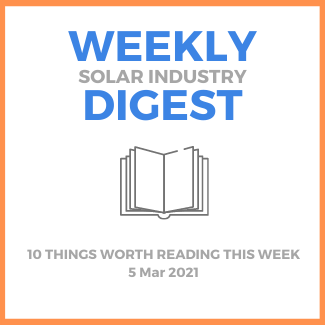Climate change, which makes damage to buildings and homes (and PV panels) more likely, has pushed property insurance premiums up by 10-60% and premiums regarding solar have gone up for 400% in the last two years. This means limitations for solar developers and financiers.
BayWa.re analyzed 10 years of online activity regarding climate change. They found it was eclipsed as a topic by COVID-19 in the past year and that over the decade public discussions went from ‘global warming’ to ‘climate crisis’ and their chats about clean energy went up 6 times more per month.
Outstanding leaders in an organization coach, engage, motivate and resolve conflict. Another key skill is being able to teach new hires and existing employees such skills. Additionally, they should consider assessing prospects for such skills via a third party screening company.
Biden’s administration backed Trump’s reinstatement of a tariff on bifacial panels. It asked the U.S. Court of International Trade to dismiss a complaint from members of the solar industry that the tariff was unlawful, saying he acted within his authority to reinstate the tariff.
The PV Inverter Product Qualification Program lays out their technical due diligence results on inverter failure due to underperformance. It looks at temperature operating windows, operation within AC voltage window, and power point tracking (MPPT) for max amount of energy.
2020’s Q4 saw a new record for US energy storage. A total of 2,156 MWh of new energy storage systems ?went live, up 182% from Q3 2020. 4 of every 5 MW was FTM storage and res storage made up 14% of the MW total. In 2020 179% more was added in 2020 than in 2019.
FERC Chair Richard Glick declared the commission’s commitment to averting a repeat of the TX disaster, starting with an upcoming report on the mass outages there. He says that the recommendations re generators winterizing their facilities that were made in 2011 will not go ignored again.
The main difference between traditional and all-black panels is efficiency ratings. They run a tad hotter and lack the benefits of reflection and light trapping. This means up to 3% lower photocurrent, resulting in 0.5% lower absolute efficiency. Companies use higher efficiency cells to compensate.
Australian researchers are looking at how to create a lifetime product stewardship scheme that invests all stakeholders throughout the value chain in managing PV panel waste and having it be recyclable. One barrier is the low value of panel material, and one draw is the possibility of job creation.
Unbound Solar has a very comprehensive, user friendly page on basic solar info for the consumer/prospect and installer. There are multiple buying guides, articles and videos that deep dive into panels, tax credit, racking, permitting, battery storage, inverters, and product reviews.

